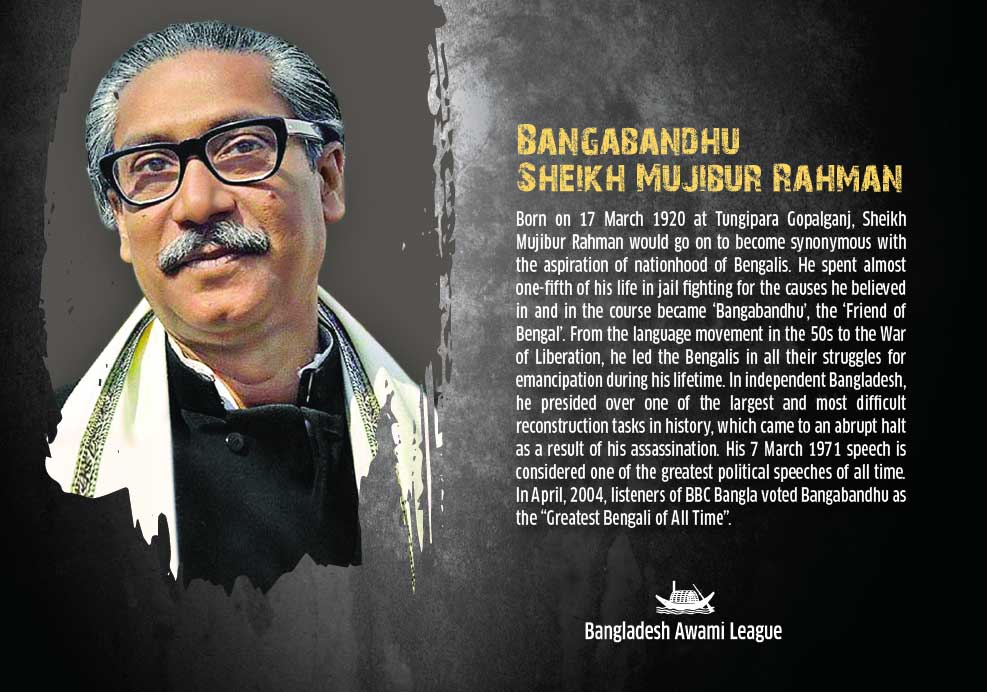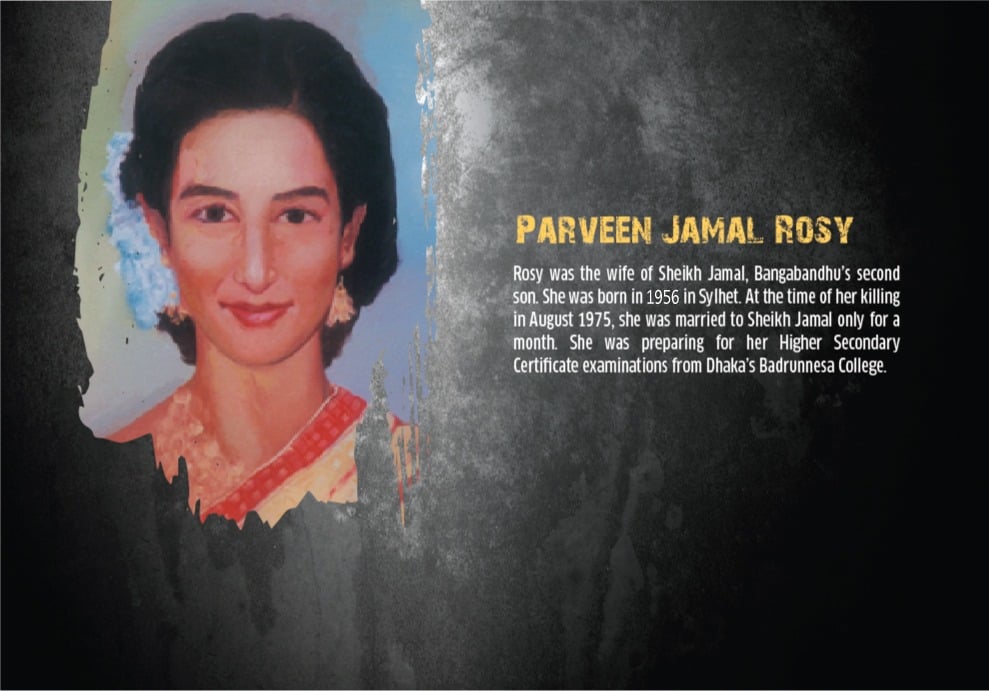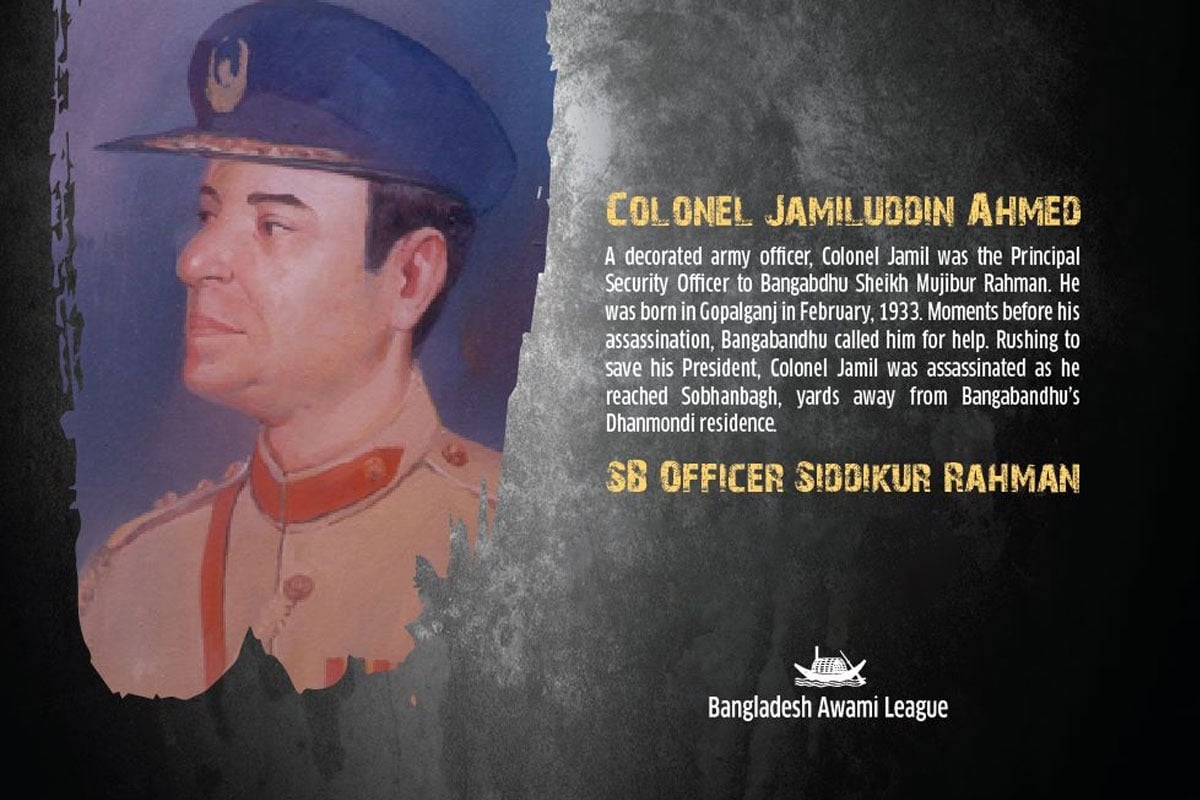
Born on 17 March 1920 at Tungipara Gopalganj, Sheikh Mujibur Rahman would go on to become synonymous with the aspiration of nationhood of Bengalis. He spent almost one-fifth of his life in jail fighting for the causes he believed in and in the course became ‘Bangabandhu’, the ‘Friend of Bengal’. From the language movement in the 50s to the War of Liberation, he led the Bengalis in all their struggles for emancipation during his lifetime. In independent Bangladesh, he presided over one of the largest and most difficult reconstruction tasks in history, which came to an abrupt halt as a result of his assassination. His 7 March 1971 speech is considered one of the greatest political speeches of all time. In April, 2004, listeners of BBC Bangla voted Bangabandhu as the “Greatest Bengali of All Time”.

Begum Fazilatunnesa Mujib, born on 8 August 1930 was the wife of Bangabandhu Sheikh Mujibur Rahman. She was not only witness to the major events of Bangabandhu’s life, but also his closest associate. Bangabandhu spent a major part of his life behind bars as a result of his political activism. During this time Begum Mujib or Bangamata as she is affectionately called, single handedly took care of the family as well as acted as the bridge between the party and the incarcerated Mujib. Many credit her as being the force which transformed Mujib into Bangabandhu.

Sheikh Russell was the youngest son of Bangabandhu Sheikh Mujibur Rahman. He was especially fond of his bicycle and accompanied his father to various places because he usually saw very little of him. At the time death, Russell was a student of class 4 at University Laboratory School. He was only 8 years old. Before shooting him dead, the killers made him walk past the bodies of his close ones.

Sheikh Kamal was the eldest son of Bangabandhu Sheikh Mujibur Rahman. Born on 5 August, 1949 in Tungipara, Gopalganj, he was a student political leader having served as the General Secretary of Chatro League in Dhaka College in 1969. He also played significant roles in the 1966 movement for self-determination, and the 1969 mass uprising. He held Bachelors and Masters degrees in Sociology from Dhaka University. He loved music and played a variety of musical instruments, including the Sitaar. He founded one of the first rock bands in Bangladesh, ‘Spondon’. He loved sports, including football, cricket and volleyball and founded one of the most popular sporting clubs in Bangladesh, Abahani, in 1972. He actively participated in the War of Liberation, receiving wartime commission in Bangladesh Army in 1971. He got married to one of Bangladesh’s most celebrated female athletes, Sutana Khuki, just one month before his death. He was only 26 at the time of his death.

Sultana Kamal Khuki, born July 1951, obtained Bachelor of Arts and Masters in Sociology from Dhaka University. She was a celebrated sportswoman and a pioneering female athlete. She came second in the Pakistan Olympics long-jump in 1966 and in 1968 won Gold medal in the same category. She held national record in long-jump and 100-meters sprint. When she was killed in August 1975, she was married to Sheikh Kamal for only a month.

Sheikh Jamal, Bangabandhu’s second son was born on 28 th April, 1954. As a teen, he was detained along with other members of family during the Liberation War of 1971. But he escaped, crossed over to a liberated zone and joined the struggle for freedom. He finished his matriculation from Residential Model School. Later as a student of Dhaka College, he went to Yugoslavia for military training. Afterwards he trained at Royal Military Academy, Sandhurst, UK and joined Bangladesh Army as a commissioned officer. On July17, 1975, he got married to Rosy. He was only 21 years old at the time of his death.

Rosy was the wife of Sheikh Jamal, Bangabandhu’s second son. She was born in 1965 in Sylhet. At the time of her killing in August 1975, she was married to Sheikh Jamal only for a month. She was preparing for her Higher Secondary Certificate examinations from Dhaka’s Badrunnesa College.

Born in 1928, Sheikh Abu Naser was the younger brother of Bangabandhu Sheikh Mujibur Rahman. He helped his brother’s politics by looking after the family affairs. He took part in the War of Liberation in 1971 and subsequently established himself as a businessman in Khulna.

Sheikh Fazlul Haque Moni was born on 4 December 1939 at Tungipara, Gopalganj. He was the nephew of Bangabandhu Sheikh Mujibur Rahman. Before independence, he was an active student leader who held organized resistance against Pakistan military regime. In independent Bangladesh, Moni founded the Bangladesh Awami Jubo League (Awami Youth League). He was a prolific writer and founded and edited two newspapers, the ‘Banglar Bani’ and the ‘Bangladesh Times’.

Abdur Rab Serniabat was born March, 1921 in Barishal. He was the brother-in-law of Bangabandhu Sheikh Mujibur Rahman. He was a lawyer turned politician. He was elected to the National Assembly in 1970 and joined the cabinet as Minister for Agriculture. Known for his staunch ideals, Serniabat was appointed as the Minister for Irrigation and Flood Control in 1973, a duty he faithfully served till his assassination in 1975.

- Born in Barisal in March 1947, Begum Arju Moni was the wife of Sheikh Fazlul Haque Moni. She sat MSS exams in political science in Dhaka University in 1975. A mother of two children, at the time of her killing in August 1975, she was pregnant. - Born in Barisal in May 1960, Baby was the daughter of Abdul Rab Serniabat. She was a class- nine student of Laboratory High School in Dhaka University. - Born in Barisal in March 1964, Arif was the youngest son of Abdur Rab Serniabat. He was a class-four student of Laboratory High School in Dhaka University.

Born in June 1971 in Barisal, Sukanto Abdullah was the grandson of Abdur Rab Serniabat - Born in Barisal in March 1940, Shahid Serniabat was the nephew of Abdur Rab Serniabat. He was the correspondent to Dainik Bangla in Barisal. - Born on 1 December, 1957 in Barisal, Abdul Nayeem Khan Rintu was the cousin of Awami League leader Amir Hossain Amu and was killed at Abdur Rab Serniabat’s house. He sat for SSC exam under Barisal Zilla School in 1975.

A decorated army officer, Colonel Jamil was the Principal Security Officer to Bangabandhu Sheikh Mujibur Rahman. He was born in Gopalganj in February 1933. Moments before his assassination, Bangabandhu called him for help. Rushing to save his President, Colonel Jamil was assassinated as he reached Sobhanbagh, yards away from Bangabandhu’s Dhanmondi residence. - SB Officer Siddikur Rahman
